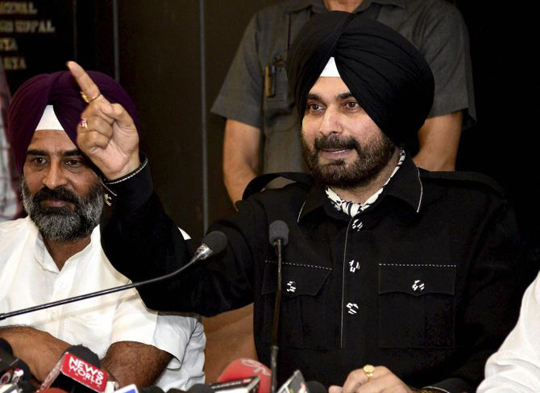Chandigarh, Sep 8: Unveiling a new front in poll-bound Punjab, cricketer-turned-politician Navjot Singh Sidhu today launched a no-holds-barred attack on Akali-BJP combine and Congress, and dubbed AAP as "anarchy in the garb of democracy" led by Arvind Kejriwal who wants only "yes-men".

Addressing a press conference on the formal launch of "Awaaz-E-Punjab"-- a non-political front for "betterment" of Punjab, the former BJP leader, who quit his Rajya Sabha seat in July, said its aim is to hand over the power of democracy to people after ending "the rule of one family" in the state.
Sidhu said that in the next 15-20 days he will come out with the front's future plan. Launching a frontal attack on the Badals, who have been in power for a decade, he said the "'kaale Badal' (dark clouds) have overshadowed Punjab and people are keen to see sunlight".
"People elect government for themselves and not for a family," he said, alleging that Badals have made Punjab and the party as their family fiefdom.
He also claimed that Akalis and Congress were "two sides of the same coin" who fought a "friendly-match" and ruined Punjab, which needed a change for its better future.
Clearing the air over speculation about his joining AAP, Sidhu claimed that the AAP leadership was after him for the last two years and made many offers, but accused Kejriwal of speaking "half truth" as he was told to not contest but only campaign.
"Kejriwal and his men were luring me for last two years to join AAP. They offered many things, but I only asked them to define my role. I wanted to know his intentions and his aim.
"He told me not to contest but only campaign. But he said my wife can contest and will make her a Minister. I thanked him. He also wanted to make me a decoration piece, which I was earlier," he told reporters.
Attacking the AAP leader, Sidhu said, "Kejriwal wants only yes men...arrogance in democracy is not acceptable."
"Kejriwal thinks only he is honest and no one else is and it is his copyright. He feels others have no right to say that they are honest. I am sitting here with people who are to help Punjab. I am ready to give my life for Punjab.
"Kejriwal is always trying to indulge in one-upmanship and take credit and no one else is allowed to do so," said Sidhu, who was flanked by Olympian and rebel SAD MLA Pargat Singh and Bains brothers - Simarjeet and Balwinder.
Attacking BJP and the Akalis, Sidhu said he was made a "decorative piece" by the ruling dispensation and was not accorded any importance even at public functions, fearing he may hog limelight.
He claimed he had rejected the Rajya Sabha nomination two years ago but Prime Minister Narendra Modi nominated him to the Upper House.
"I accepted the Rajya Sabha as I thought if it takes me towards Punjab, then it is like a pilgrimage for me. I quit Rajya Sabha because there were instructions to campaign for Badal sahib.
"It was not possible to stand with Dhritrashtra. They are Dhritrashtra and Dusshasana. They nominated me to Rajya Sabha and one BJP leader said campaign for Badal and other said 'don't go to Punjab'," he said, making an analogy with characters of epic Mahabharata.
Over the issue of his quitting the Rajya Sabha seat, he said that, "It had nothing to do with AAP supremo Arvind Kejriwal. It was a conscientious decision." "Men of genius are admired, men of power are feared, but men of character are trusted. And we fall in the third category," he said.
"We have united to help Punjab win. And this time Punjab will win and so will Punjabiyat and the people of the state. Once considered the granary of the country has now turned into a begging bowl which is deep in debt.
"We want to shake the system that has ruined Punjab. It can only happen when like-minded people get together. We invite all those without any selfish motives to come together and unitedly fight for the state and help in the resurrection, redemption and revival of Punjab," he said.
Sidhu claimed that people have suffered in the hands of five years of Congress government led by Capt Amarinder Singh and during the last 10 years of 'danda tantra' (rule of the stick) where, he alleged, false cases were slapped on people and votes were secured forcibly and through polarisation.
He also said there was discrimination on the basis of caste, colour and creed. "We are not fighting for personal gains but for Punjab's better future," he said.
Targeting Aam Aadmi Party, he said, "The East India company came with 40,000 troops and ruled over 40 crore people in India.
"Like that, the Central India company has sent 40 people and want to rule over Punjab by dividing the people of Punjab. There is no difference. They talk to individuals and people are told and never heard."
Sidhu formally launched the front as Kejriwal started his four-day visit to the state to boost the party's campaign.
Sidhu said that a system has creeped in the country where good people are kept as "decorative pieces".
"Good people are used for campaigning and when not needed they are thrown out... they become mute. This is a sin," he said.
"We 10-15 leaders will become a big example (of bringing change in Punjab)," he said.
"While men of power are afraid, men of character are frustrated," he said noting that they fall in latter category.
He said that people of Punjab want a change of governance and this can be achieved by strong leaders.
"We will work for Punjab, Punjabiat and in the end Punjabiat will win," he said listing the agenda of his front.





Comments
Add new comment